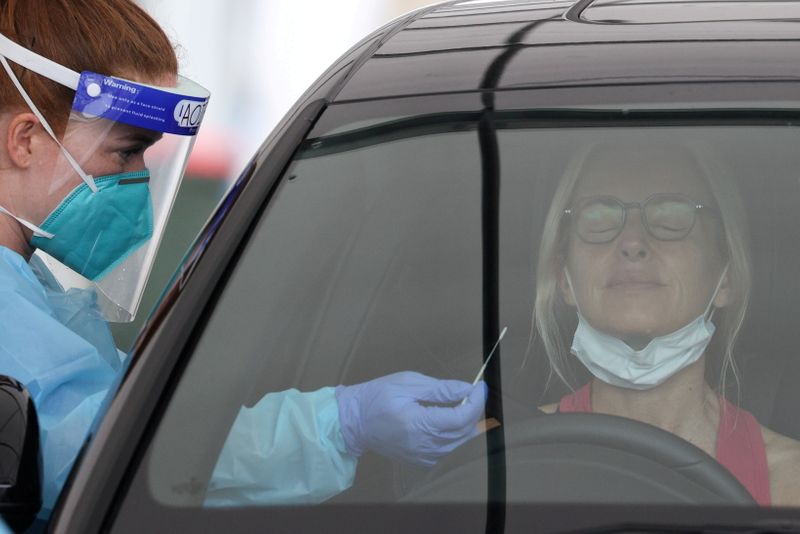By Colin Packham and Renju Jose
CANBERRA (Reuters) - Australia's most populous state reported its first locally acquired coronavirus infection in more than a month on Wednesday, with health authorities working to track down the source and the variant involved.
The first local infection in southeastern New South Wales since March 31 strengthens prospects for a resumption of social distancing curbs, many of which had been eased as cases dwindled.
Although Australia has largely eradicated COVID-19, a man in his 50s with no known links to hotels used to quarantine people who have arrived from overseas tested positive on Tuesday, the state's health ministry said in a statement.
The unidentified man visited several spots in the eastern suburbs of Sydney, the state capital and Australia's biggest city, the ministry said.
Testing showed a higher viral load than typically seen in infected people, potentially increasing the chance that the man has spread the disease, the ministry said. He is considered to have been infectious since April 30.
"That gives us some cause for concern," the state's chief health officer, Kerry Chant, told reporters in Sydney, adding that all those who had been in close contact with the man had been told to self-isolate and get tested.
Authorities are investigating whether the case is genetically linked to anyone in the quarantine system or cases in other states, Chant said.
They are also checking which virus variant is involved.
Australia's hardline approach to rein in COVID-19, with measures including snap lockdowns, border controls and swift contact tracing has kept its tally of infections at just over 29,800, with 910 deaths since the pandemic began.
However, Prime Minister Scott Morrison has drawn wide criticism for a decision to block all travel for two weeks from India, which is battling a massive second wave of COVID-19 infections.
Anger surged after the government vowed on Saturday to punish attempts to enter from India with jail terms of up to five years and fines.
For more than a year, Australia has allowed only citizens and permanent residents to return, though they must spend two weeks in strict quarantine.
Morrison defended the ban on Wednesday, saying it had prevented hotel quarantine sites from being overrun.
"This was a necessary step to ensure that we could help more Australian citizens and residents get home, safely, in a way that did not risk a third wave in Australia," Morrison told a televised news briefing in the northeastern state of Queensland.
Academics and lawyers have questioned the validity of the India ban, despite the government's assertion that it was temporary, and on Wednesday a legal challenge was launched.
Lawyers for Gary Newman, a 73-year-old who has been stuck in India since he travelled there in March 2020, will argue that Australia's conservative government does not have the constitutional power to block people returning from India.
No ruling was given, with Justice Stephen Burley agreeing to set a hearing date within 48 hours.
"This decision that the government has made ... is invalid," Newman's lawyer told the Australian Broadcasting Corp after a short administrative hearing. "It sets an extraordinary and appalling precedent and that needs to be challenged."

Luke Beck, an associate law professor at Monash University, told Reuters it would be difficult to win a case based on interpretations of the Australian constitution since the constitution "does not expressly list any special citizenship rights".